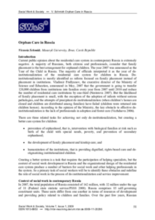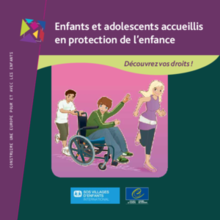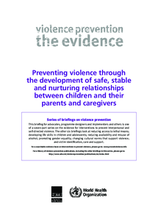Demographic Data
|
Sources: World Bank, UNICEF, UNDP HDR 2015, DHS 2013 |
Displaying 13511 - 13520 of 14554
Current public opinion about the residential care system in contemporary Russia is extremely negative. A majority of Russians, both citizens and professionals, consider that family placement is the best arrangement for orphaned children.
Learning by Ear, le programme de divertissement pédagogique de la Deutsche Welle aborde la question du droit des enfants et consacre son 4eme episode aux enfants des rues de Lagos.
« Enfants et adolescents accueillis en protection de l'enfance - Découvrez vos droits! » est un livret d’information qui s’adresse aux enfants et aux jeunes pris en charge de manière alternative. Il contient des bandes dessinées, des petites histoires et des textes informatifs permettant aux enfants et aux jeunes de découvrir leurs droits et d’apprendre à jouer un rôle actif dans leur propre prise en charge.
Ce rapport est basé sur une évaluation indépendante du SSI réalisée en 2009. Son principal objectif est d'identifier et débattre des problèmes liés au processus d'adoption en vue d'aider le Vietnam à préparer sa ratification de la CLH-1993.
Guide de Programmation pour les enfants sans prise en charge parental.
L'objectif de ce manuel est de présenter un ensemble d'indicateurs globaux communs pour la prise en charge formelle des enfants, notamment des enfants vivant en institution ou en famille d'accueil suite à un arrangement formel (
This document includes a portion of the individual worksheets accompanying the Manual for the Measurement of Indicators for Children in Formal Care.
This report brings together an eight-part series of briefings on the evidence for interventions to prevent interpersonal and self-directed violence. By spotlighting evidence for the effectiveness of interventions, the series provides clear directions for how violence prevention funders, policy makers and programme implementers can boost the impact of their violence prevention efforts.
This briefing looks at the effectiveness of interventions that encourage safe, stable and nurturing relationships for preventing child maltreatment and aggressive behaviour in childhood. The focus is on primary prevention programmes, those that are implemented early enough to avoid the development of violent behaviour such as child maltreatment and childhood aggression.
This document is the seventh, and final, chapter of Doing Better for Children: The Way Forward, produced by the Organisation for Economic Co-operation and Development. The aim of this chapter is to contribute to the policy debate on child well-being, synthesising the previous chapters and drawing on the existing research and policy literature.









